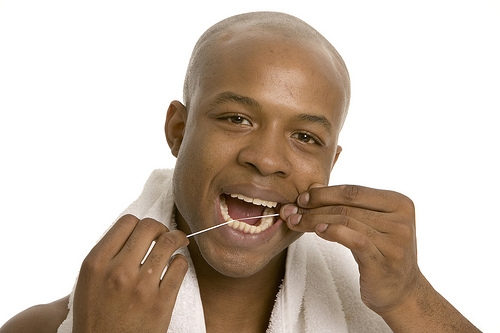January 4th, 2023

At Oral Surgery of Tidewater, we prefer our patients to practice good oral hygiene between office visits. Part of that process includes flossing, which Dr. Ford and Dr. Guter will tell you, is the process of cleaning between the teeth to remove food and debris from the areas that are hard to reach with a toothbrush. When food is allowed to remain between the teeth, it provides a breeding ground for bacteria, which can cause periodontal disease.
Should you floss before or after brushing?
You can floss either before or after brushing, according to your own preference. By flossing first, you can brush away dislodged food debris afterward. On the other hand, brushing first allows you to loosen plaque between the teeth, making it easier to floss more effectively.
Whichever you choose, the most important goal is to floss thoroughly. That means using a fresh strand of dental floss each day, and carefully pulling it back and forth between all of the teeth. Do not skip flossing because your teeth look or feel clean.
When to Floss
Unlike brushing, you need only floss between your teeth once per day. Although you may choose to do it in the morning or afternoon, many prefer to floss at night to prevent food and debris from remaining in the crevices of the teeth overnight. This could prevent the build-up of plaque too, which is a cause of tooth decay.
Help with Flossing
If you have questions about your flossing technique or what type of floss is best for your teeth, contact our office. Our staff will be more than happy to assist you in perfecting your home hygiene regimen. In most cases, you can choose between interdental cleaning picks or flexible floss strands to perform your daily flossing routine. If you have permanent oral appliances or restorations, be sure to follow the flossing instructions provided to you, and contact our Virginia Beach, VA office with any questions.
December 28th, 2022

We’ve been celebrating the new year for a really, really long time. It goes way back, but it started formally in 1582, when Pope George XIII made January 1st the official holiday for ushering in the new year. The idea was to yell, cheer, and blow horns to scare away all the evil spirits of the previous year with the hope that the new one would be filled with happiness and opportunity.
While scaring away evil spirits isn’t what’s on our mind these days, we still ring in the New Year by cheering and hollering with friends and family. It’s a time to set new goals, refocus on old ones, and look forward to all the surprises the coming year will bring.
Whether you’re saying hello to the New Year snuggled up at home on your couch in the Virginia Beach, VA area or by gathering your friends for a social celebration, here are some tips to help ensure you welcome this new chapter with a smile.
Tips for a great New Year’s Eve celebration from Oral Surgery of Tidewater
- Stay safe. This one’s vital, because nothing puts a damper on your party like an emergency trip to the hospital. Stay responsible and try to plan ahead, whether that means taking a taxi, staying with a friend, or recruiting a designated driver. Do what you have to do to keep yourself and everyone around you safe.
- Spend time with the people you love most. The way we see it, the whole point of the holiday season is to cherish your family and friends. Regardless of what you’re doing, make sure there’s something for everyone. It’s essential to do something the whole group will enjoy!
- Smile! Whether you get all dressed to go out or have a quiet gathering with family and friends, make sure you accessorize with a smile. There’s always something to smile about!
We can all agree that change can be scary sometimes, but ringing in the New Year is an observance we all welcome with open arms. We hope you’ll enjoy this transitional holiday in a fun, healthy, and safe way. You have endless possibilities ahead of you!
From Dr. Ford and Dr. Guter, have a fantastic New Year!
December 21st, 2022

It's almost game day and you're wondering what to put on the menu for your guests. Most snacks are typically highly processed and unhealthy. Why not mix it up this year and opt for some snacks that promote good oral health? Here are some of Dr. Ford and Dr. Guter favorites!
- Apples, carrots, celery, and cucumbers: These foods and other crispy, fibrous, fruits and vegetables are an excellent choice for the big game. Not only are they rich in vitamins and minerals which your body and mouth need, they are also known as detergent foods because of the cleaning effect they have on the teeth and gums. Try apples wedges spread with peanut butter and sprinkled with cinnamon.
- Beans: Beans are filling because they are packed with fiber and that keeps you from opting for sugary or fatty snacks. Along with fruits and vegetables, beans should be one of the stars of your game-day snack lineup. How about some hearty chickpea hummus with cucumber chips?
- Nuts like almonds, walnuts, pistachios, and cashews: Nuts abound in the minerals that help keep your teeth and gums strong like calcium, magnesium, and potassium. Put out a bowl of raw or roasted nuts for your guests as a crunchy, satisfying alternative to chips or crackers. Recent research even shows that the polyunsaturated fatty acids in nuts may help prevent gum disease. But remember not to eat the whole bowl! Nuts are very high in calories and a little goes a long way. Enjoy and handful or two along with your other healthy snacks.
- Dark chocolate: This one may be hard to believe at first, but research shows chocolate can be great for your teeth and help prevent decay! Now don't run off and start stocking your pantry with a bunch of that super sweet stuff, because these benefits come mainly from the tannins, polyphenols, and flavonoids present in the cacao bean. Dark chocolate is the least processed variety of chocolate and the closest to the cacao bean, so make sure you purchase a variety that is listed as 70% cocoa or more for these benefits. Like with nuts, chocolate is easy to overdo — aim to eat two or three squares.
December 14th, 2022

As more people turn to bottled water and away from the tap, they may be missing out on one important ingredient that most brands of bottled water fail to include: fluoride! Because fluoride helps strengthen teeth, it is an important component of maintaining good oral health. Our friends at the American Dental Association have endorsed both community water fluoridation and the use of fluoride-containing products as a safe means of preventing tooth decay.
In fact, the Centers for Disease Control and Prevention has also warned that “bottled water may not have a sufficient amount of fluoride, which is important for preventing tooth decay and promoting oral health.” If you are avoiding fluoridated tap water in favor of ever-more-popular bottled water, you could be missing out on the levels of fluoride necessary to make a difference in your oral health. One 2012 study in the Journal of Pediatric Dentistry found that more than 65 percent of parents using bottled water did not know what levels of fluoride it contained.
If bottled water happens to be your or your children’s beverage of choice, check the label to make sure your brand contains fluoride. Of course, simply drinking fluoridated water is not a magic ticket to perfect teeth. To keep your pearly whites in tip-top shape, it’s important to brush and floss daily and avoid sugary sweets, in addition to maintaining your fluoride intake.
Questions about fluoride? Give us a call at our convenient Virginia Beach, VA office! We look forward to hearing from you!






 Website Powered by Sesame 24-7™
Website Powered by Sesame 24-7™